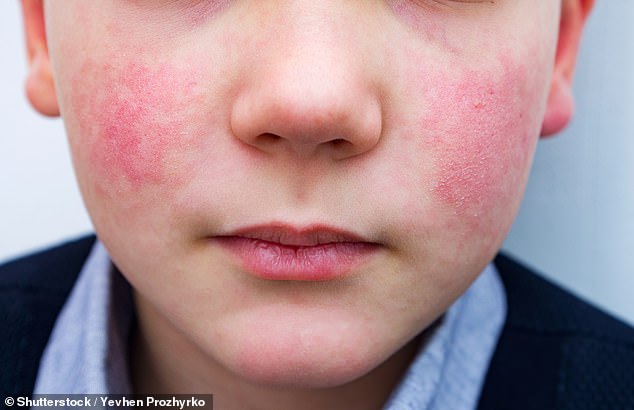A highly contagious virus that can cause miscarriages is sweeping Britain – and Covid and never-ending lockdowns could be to blame.
MailOnline can reveal that levels of parvovirus B19 have reached a decade-high in women of child-bearing age in England.
The virus itself triggers 'slapped cheek syndrome' – nicknamed so because of the distinctive rash it causes.
Although common but typically harmless in children,it can prove more serious in adults,especially pregnant women.
Up to one in eight pregnancies affected by parvovirus end in miscarriage,the NHS states. The risk is highest during the first 20 weeks.
Your browser does not support iframes.
Your browser does not support iframes.

An illustration of parvovirus B19 particles in the bloodstream. Two-thirds of adults are thought to be immune to because they've had it and suffer just mild flu-like symptoms
‘The circulation of the virus in the population cycles up and down over time and we are currently in an up phase with numbers as high as have been seen in the last decade,’ he said.
‘Notably there were very few infections in the Covid years,so the number of people with naturally acquired immunity could be lower than would normally be the case,leading to the high numbers we are seeing.’
He added that parvovirus is what experts call a ‘background’ infection that people normally contract as children and then get immunity for life.
While normally mild even in later life he added at-risk groups,like pregnant women due the potential impact of the foetus,needed to be monitored appropriately if they contract it.
Triggered by a virus it initially causes general fly-like symptoms like a high temperature,runny nose and sore throat,as well as a headache.
Sufferers then develop a tell-tale rash on their cheeks that give the virus its moniker.
This rash usually fades within one to three weeks.
Adults can also develop joint pain if they contract the bug,though this is rare in children.
However,almost one in three people infected will display no symptoms,though they can still pass on the disease to others.
On the whole parvovirus is considered a mild illness with one critical exception,it's impact on pregnant women.
While not a danger to women themselves,a parvovirus infection during pregnancy increases the risk of a women suffering a miscarriage.
The risk is higher the early an expectant mother is in her pregnancy,with estimates putting rate of miscarriage while infected at between one in eight to one in 10.
This is why pregnant women are advised to tell their midwife or a GP if they have been near someone with slapped cheek syndrome.
Advertisement
‘Health care professionals need to be aware that the virus is around so that tests can be done if infection of one of the at-risk groups is suspected,’ he said.
Dr Simon Clarke,a cellular microbiologist at Reading,added said although the base number of cases seem low they were likely an underestimate of what was happening in the community and its potential impact on expectant mothers.
Human parvovirus infection is usually asymptomatic,so we never really have the full picture of the degree to which it’s circulating in the population at any given time,’ he said.
‘Although these numbers are low,meaning that small fluctuations in infection numbers may look like a more dramatic increase than is really the case,the risk of miscarriage means that it should not be taken lightly.’
Like Professor Jones,he suspected Covid lockdowns and other restrictions led to a restriction of transmission and it cannot be ruled out there was now a lower immunity amongst the population.
‘Like Covid-19,human parvovirus relies on person to person spread and it therefore seems likely that the Covid-19 lockdowns and restrictions limited the spread this virus too and we may now be returning to a more normal pattern of infections,’ he said.
‘Given the very low numbers of detected cases,it’s not plausible to say for sure that there has been a decrease in the overall population levels of immunity to parvovirus,but that cannot be ruled out.’
Testing for parvovirus – easily mistaken for other rash-inducing illnesses,including rubella – isn't consistent nationwide.
Only mothers-to-be exposed to infected people or who have developed a rash get checked.
Pregnant women confirmed to be infected are monitored closely for three months through regular ultrasounds to check their baby's health.
Currently,there are no ways to treat the disease directly or prevent the baby from being infected.
Babies in the womb can suffer from fetal anaemia as a result of parvovirus infection and while this can sometimes be treated via special blood transfusion to the foetus this procedure itself carries a risk of miscarriage.
Data

Explore our curated content, stay informed about groundbreaking innovations, and journey into the future of science and tech.
© ArinstarTechnology
Privacy Policy